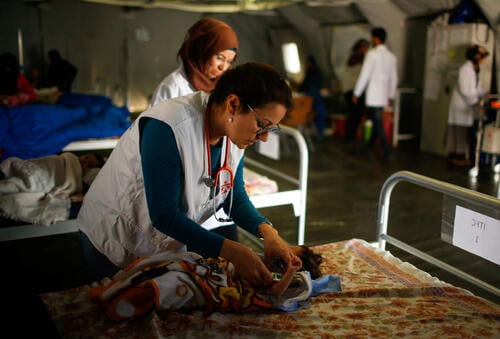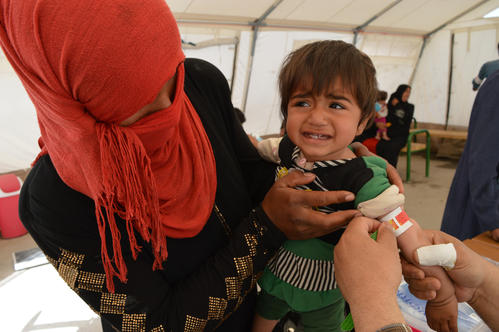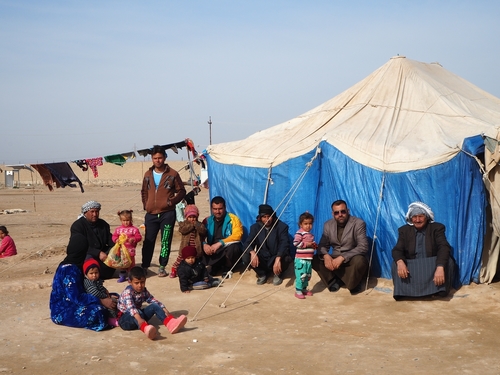The battle for Mosul has taken a staggering toll on the people of Iraq’s second largest city, particularly on those who recently escaped from inside western Mosul, where extremely intense fighting inflicted high number of casualties and deprived the population of access to assistance for several months. Health needs are shifting from war injuries to medical cases and long-term rehabilitation care.
West Mosul
In June, MSF opened activities at a medical structure in West Mosul to give life-saving trauma assistance to war-wounded people escaping from the final conflict areas of the Old City, and to provide maternal care for people returning to the area.
The project provides surgery, short-term post-operative care, maternity and newborn units, paediatrics, an emergency room and an inpatient department. Since opening, the hospital has provided assistance to more than 3,671 patients in the emergency room, including 362 patients with war-related trauma injuries, and 448 deliveries. The inpatient ward, which opened on 20 July, has admitted 275 patients.
East Mosul
Al-Khanssa Paediatrics Teaching Hospital
In July, MSF started to support Al-Khanssa Paediatrics Teaching Hospital, a public health facility that was heavily damaged during the conflict. As a result, the hospital’s 400-bed capacity was reduced to 120.
MSF began by rehabilitating and equipping a 20-bed temporary emergency room. In the medical paediatric ward, two 14-bed rooms have been rehabilitated.
Teams supported the opening of a 14-bed inpatient therapeutic feeding centre and have just completed the construction of an expanded 20-bed emergency room. By mid-October MSF will finish the rehabilitation of an intensive care unit. Since the beginning of August, 1,642 patients have been treated in the emergency room and the paediatric ward has admitted 554 patients.
Outskirts of Mosul city
Qayyarah
In Qayyarah, 60 kilometres south of Mosul, MSF opened a hospital in December to provide surgical and emergency medical care. To cater to the growing and diversifying needs, the facility now has 62 medical beds, including an intermediate care unit, observational beds and two resuscitation beds.
The hospital extended its paediatric capacities to address high numbers of infants, mostly under the age of six months, suffering from malnutrition.
More than 9,000 patients have been treated in the emergency room and 17 per cent of them were admitted to the inpatient department. A total of 1,400 surgical interventions have been performed and more than 535 malnourished infants have been admitted to the therapeutic feeding programme.
An MSF team composed of a psychiatrist, two psychologists and two psychosocial counsellors works at a mental health clinic for patients admitted to the hospital or referred from Qayyarah camps. More than 1,300 mental health consultations have taken place.
Qayyarrah camps
In late July, MSF opened an ambulatory feeding programme in the Qayyarah camps, where an estimated population of 160,000 people displaced from Mosul are living.
Two clinics have opened in Jeddah 6 and Airstrip camps and a third is under construction in Jeddah 5. A group of 340 children – including follow up patients referred to by Qayyarah inpatient therapeutic feeding centre ITFC – are currently in the programme. The programme provides assistance to children under five years of age, with a special focus on babies under six months of age who are at the highest levels of risk. The programme also includes a baby-friendly area with a focus on breast feeding promotion, and support for mothers to resume breast feeding. Malnutrition-related mental healthcare is also provided.
Post-operative and rehabilitation care, Al Hamdaniya
MSF was providing post-operative care with rehabilitation and psychosocial support in Al Hamdaniya hospital in collaboration with Handicap International. Activities started in March and closed on 14 September. Post-operative services will be shifted to Al Shifa hospital (East Mosul) in October.
Camps for displaced people east of Mosul
Following the offensive launched into west Mosul in mid-February, the total population of camps for displaced people east of Mosul in areas controlled by the Kurdish Regional Government increased.
Today, MSF mobile teams give treatment for chronic diseases (mainly diabetes, epilepsy, asthma, thyroid dysfunction and hypertension). In addition, an MSF team of more than 20 psychiatrists, psychologists, mental health doctors and counsellors provides care in nine camps to people suffering from moderate to severe mental conditions. Activities include psychological and psychiatric consultations, group therapy, psychosocial counselling and child therapy. In 2017, the teams working in the camps have so far carried out close to 23,000 medical consultations, including primary healthcare and non-communicable diseases, and more than 18,000 mental health consultations.
Elsewhere in Iraq
Diyala governorate
MSF has been working in Diyala governorate since 2015, and supports displaced populations in three camps for displaced people in Khanaqin district. Teams, working in collaboration with the Directorate of Health, had provided more than 10,000 individual and group counselling sessions medical and mental health consultations by July 2017.
MSF teams also conducts health promotion activities in all camps. MSF supports the primary healthcare clinics in Sadiya and Jalawla. The focus is on chronic diseases, sexual and reproductive health, maternity, mental health and health promotion services for displaced people, returnees and the host community. MSF provided treatment for chronic diseases to nearly 1,200 new patients and almost 6,000 follow-up consultations. In addition, 5,500 ante- and post-natal consultations were provided until July 2017.
Babylon governorate
Since the spring of 2017, MSF has been supporting the Ibn Saif Paediatric Hospital located in Musayib. The team concentrates on supporting this 40-bed hospital through capacity-building and training, as well as logistics support. An average of 280 patients are admitted per month, including newborns. MSF has created a psychosocial unit for inpatients and the community.
For information on projects in the governorates of Nineveh, Kirkuk, Dohuk, Sulaymaniyah, Salah Al-Din, Diyala and Anbar, please refer to the June 2017 update.






